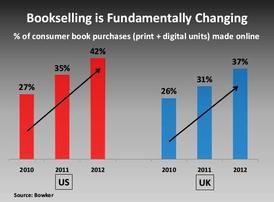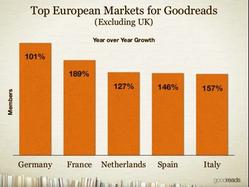 Bookselling worldwide is "fundamentally changing," said Russ Grandinetti, v-p of Kindle content at Amazon, at yesterday's Publishers Launch conference at the Frankfurt Book Fair.
Bookselling worldwide is "fundamentally changing," said Russ Grandinetti, v-p of Kindle content at Amazon, at yesterday's Publishers Launch conference at the Frankfurt Book Fair.
In 2012 in the U.S., 42% of all consumer purchases of print and digital books were made online; a year from now, more than half of all purchases of all types of books will be made online, Grandinetti said. He predicted that in two years, the U.K., which has closely followed the U.S. in digital trends, will also reach that level, and in three years "the rest of Europe" will follow.
Grandinetti urged publishers to rethink how they approach marketing, saying, "The time is not far off where a publisher doing an author business plan who doesn't think of online first is doing a disservice to the author." Traditionally, he continued, publishers have kept in mind "physical" bookselling and how to get customers in bookstores to take a book to the checkout counter. Now, the challenge is much different, he said, and conjured up an image of someone at home at 8:30 on a Tuesday night with two hours before going to bed. How does that person find your book, he asked. "The set of skills for that are obviously quite different."
Without divulging unit or dollar sales figures, Grandinetti showed charts of the gradual growth of sales of print books by Amazon in the U.S. and U.K. with abrupt jumps in e-books after they were introduced--and in a matter of several years, surpassing print book sales. While it's still early in other markets, he emphasized repeatedly that the trends lines in other countries where Amazon operates, including Germany, France and Japan, resemble those in the U.S. and U.K., and "there is little that makes us think things will be different." The key elements of book digitization, customer service, customer receptiveness and people online are all in place in those markets.
He also emphasized that Amazon's growth in Germany, which has fixed book prices, has taken place without the widespread discounting that helped Amazon establish itself as a formidable book retailer in the U.S. and U.K.
Grandinetti said, too, that the growth of e-books around the world has resulted in non-English-speaking markets being the "single-largest" area for expansion for English-language publishers. So far this year, sales of English-language titles in non-English-speaking markets have surpassed last year's levels. Conversely, sales of foreign-language titles in English-speaking countries are growing and represent an opportunity for foreign publishers.
Grandinetti stressed that the book world needs to make books attractive "relative to other entertainment choices," but his example--counter to his mention of growing in Germany without the ability to discount--implied that pricing was the key way to expand. Again he mentioned a reader at 8:30 on a Tuesday evening--in this case having the choice of playing Angry Birds, watching a movie or reading. He then showed a slide of the French title Un Avion Sans Elle by Michel Bussi, whose digital version is priced at 15.99 euros (about US$21.75), much higher than printed copies (a paperback edition goes for 9.90 euros), and suggested that such a price would lead the reader to "probably pick Angry Birds." His conclusion: "Books need to be an attractive alternative or we'll miss out."
Getting people's attention is key, he continued. Citing Kindle's Daily Deal, he said, it's important "to get customers to think about us every day."
Grandinetti also said it was "shocking and sad how poor quality control is from so many publishers." If many digital books went out as printed books, publishers would "call the trucks back" because of the many mistakes involving spelling, formatting, tables of content and indexes as well as navigation. "And if you don't know that the last is," he said, "you should."
--- Otis Chandler, CEO and co-founder of Goodreads, didn't directly address the company's purchase in March by Amazon, although he said that the Goodreads' plans to expand internationally will be helped by Amazon's "deep databases." As of now, Goodreads is an all-English language site, but its goal is to have a catalogue that includes every book in every language ever published. As it is, Goodreads has been doubling in size in many English-language countries outside the U.S.
Otis Chandler, CEO and co-founder of Goodreads, didn't directly address the company's purchase in March by Amazon, although he said that the Goodreads' plans to expand internationally will be helped by Amazon's "deep databases." As of now, Goodreads is an all-English language site, but its goal is to have a catalogue that includes every book in every language ever published. As it is, Goodreads has been doubling in size in many English-language countries outside the U.S.
He predicted that Goodreads "will invent some cool new things in the next few years." If done right, he continued, "we will match and surpass the experience of going into a well-curated bookstore and walking out with three or four books." --John Mutter

